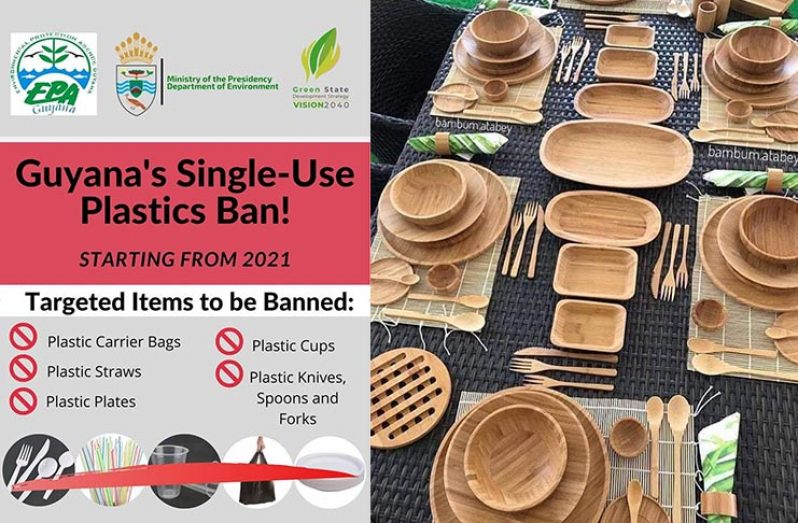Guyana will be joining a global concerted effort to ban single-use plastics due to their impacts on human health, marine biodiversity and the environment, in 2021. As such today we will explore the frequently asked questions about the single-use plastic ban.
1. Why is a ban on single-use plastics important to Guyana?
* Contributes to climate change – the production of plastics generates carbon dioxide as they are made from fossil fuels. In 2018, world plastics production totalled around 359 million metric tons.
* Negative impacts on biodiversity – when improperly disposed of, single-use plastics end up in our oceans, and often in the digestive systems of marine animals, some of which we consume. Some single-use plastics such as fishing nets end up trapping turtles which are an important part of the ocean ecosystem.
* Impacts on human health – in the absence of regular waste collection, some persons resort to burning their waste. When burned, the harmful chemicals used to create these items are released.
* Impacts on the tourism sector – during cleanups of our beaches and shorelines, single-use plastics, particularly bottles and food utensils are commonly found, diminishing the beauty of those areas. A growing tourism sector, whether local or one that depends on foreign visitors is dependent on a pristine environment.
* Impact on the environment – even when disposed of properly (in the landfill), plastics do not break down for thousands of years, taking up space that can otherwise be used for agriculture or housing. Further, when compressed, flammable and noxious gases are released into the environment.
2. When will the ban take effect?
The ban on these items will be introduced in a phased approach. While set to commence in 2021, the exact date for full implementation is not yet known given the current COVID-19 pandemic and the delay of planned face to face public consultations. In the interim, virtual consultations are being conducted.
3. Are plastic bottles included in the list of banned items?
Plastic bottles are not included in this phase of the ban. The items proposed currently are plastic straws, plastic food utensils, cups, and plastic bags at point-of-sale.
4. What will happen to the plastic bags that were purchased by businesses before the ban was implemented?
Businesses will have a six- month transition period to use their current supply before fines come into effect.
5. Will the government reduce duty and value added tax?
A Task Force comprised of representatives from various government and non-state organisations will propose measures for consideration by the Ministry of Finance.
6. What are some alternatives to banned items?
Some alternatives include:
* Cloth and paper bags;
* Wood and bamboo utensils;
* Paper, steels and bamboo straws; and
* Paper cups and plates.
7. WILL THE PUBLIC BE INVOLVED IN THIS PROCESS?
Yes. The Environmental Protection Agency has hosted several consultations prior to lockdown restrictions. Additionally, we have visited business and small groups to educate them about the ban. As previously mentioned, virtual consultations are being held with various stakeholder groups. Updates are also posted to our social media platforms listed below.
Email:eit.epaguyana@gmail.com or sinlgeuseplastics592@gmail.com
Facebook: EPA-Guyana
Instagram: epagyig
YouTube: Environmental Protection Agency Guyana
We also invite you to participate in our survey on the ban at https://www.surveymonkey.com/r/PG637KZ?fbclid=IwAR2GFyfC6KGfotQ3m0bCanSUBn7eyCs9XWsOGsBJ6-sGLqOZheQaFdsDi0M




.png)









